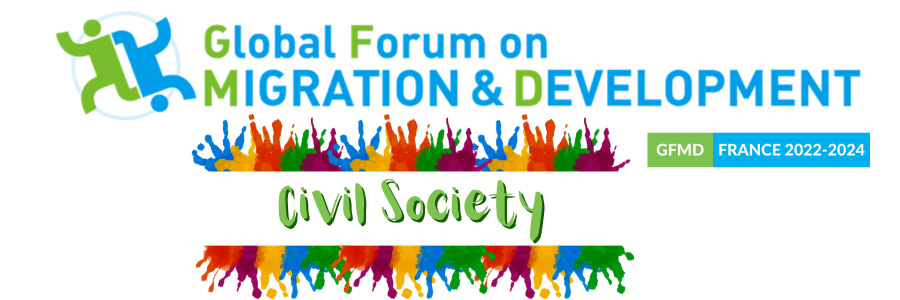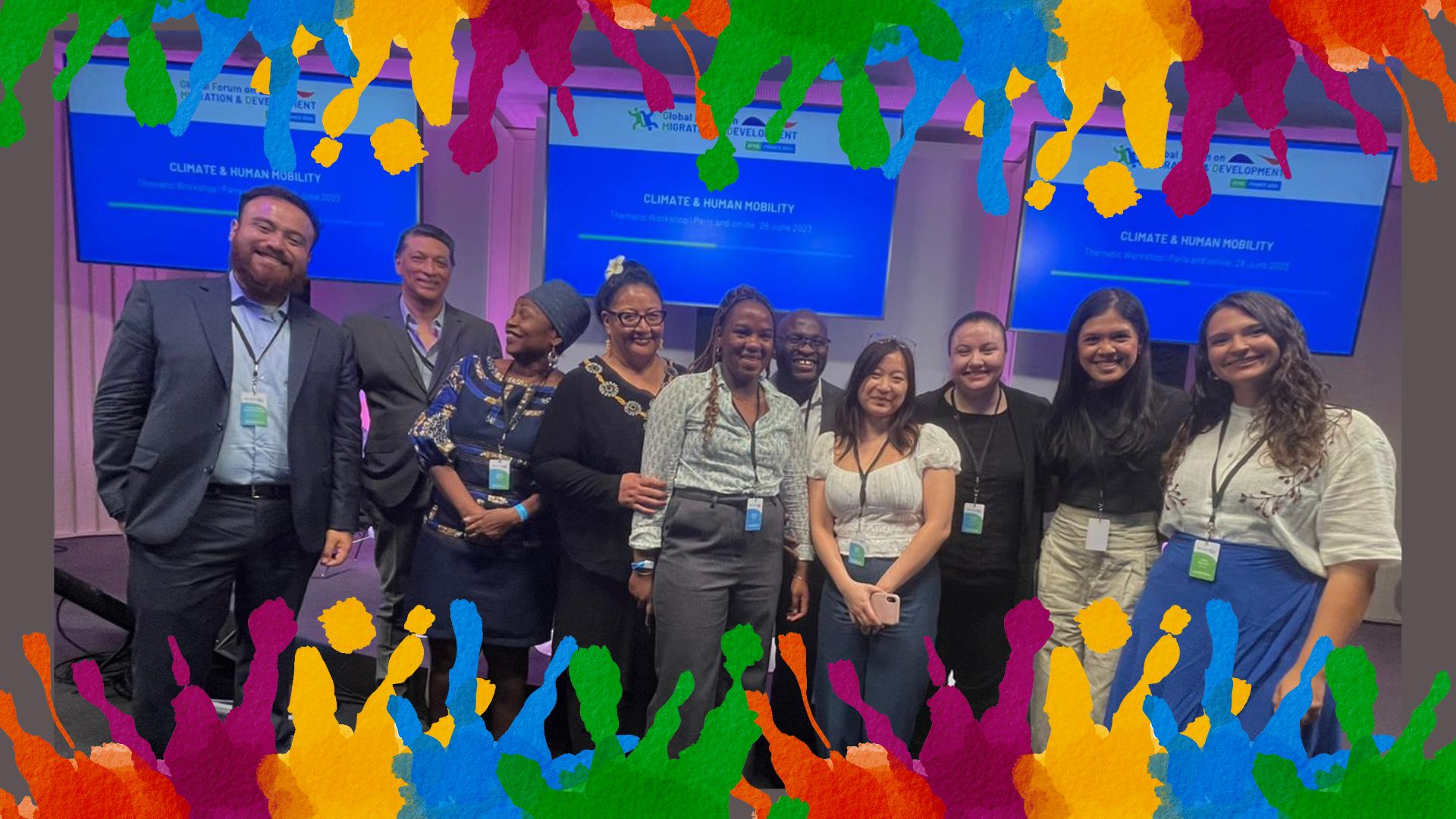Since July 2022, when the French Chairmanship of the Global Forum on Migration and Development (GMFD) began, there has been a flurry of activities involving various GFMD stakeholders. These activities have included thematic workshops on labour migration in April, a preparatory meeting in Geneva, online and regional activities and consultations co-organised by civil society.
June has been a particularly busy month for civil society engaged in the GFMD process. The first Paris workshop held on 27 June at the National Museum of Immigration History, focused on ‘Culture, Narratives and Human Mobility’. The second event, held on 28 June at the Agence française de développement, centred around ‘Climate and Human Mobility’. Both events featured selected civil society experts as panel speakers.
In order to gather collective global civil society inputs and provide the speakers with a wider range of perspectives and updated information on ongoing civil society work, the GFMD Civil Society Mechanism organized a global civil society consultation one week prior to the GFMD workshops. Various civil society organisations, trade unions, and other non-state actors participated and shared valuable insights on key advocacy points, illustrated with regional and national examples, to be addressed during the workshops.
In Paris: Voices of civil society on issues of culture and narratives
On the first day, diverse voices across civil society were brought together to discuss the interconnected issues of culture and narratives, including perspectives from diaspora community leaders and artists themselves. The following insights were contributed by our speakers.
Cecilie Kern from the NGO Committee on Migration, when addressing issues of public narratives on migration and displacement, emphasised that:
- Narratives need to balance accurate, data-based evidence with compelling human stories to be effective.
- Highlighting both migrant contributions to communities and building understanding of structural concerns is necessary to promote social cohesion, focusing on solidarity, reciprocity and common humanity.
- Migrants need to shape their own narratives, be part of discussions, and provide space to both contribute and preserve their culture, music, food and spiritual practice.
- Migration is a hopeful experience, and dignified regular pathways allow for the positive effects of migration to shine.
Brice Monnou from FORIM made a powerful intervention, calling out the continued dichotomy of ‘expat’ vs ‘migrant’ and the crucial need for migrant inclusion and centred voices.
Khady Sakho also representing FORIM, on diaspora as actors of cultural and social development and exchange, highlighted:
- The need for a multi-state approach to facilitating mutual development, with diaspora needs and channels as the starting point.
- That culture is not one-dimensional, and that African diaspora has contributed greatly towards the cultures of both their host and heritage countries.
- The diaspora cares deeply about their countries of origin and has developed innovative models on remittances and on-ground support that can and should lead the way.
Onyekachi Wambu from AFFORD UK, ended the day’s panel on the role of culture and art in fostering dialogue confronting hard-hitting truths:
- The continued racism and difficulties in labels that question the belonging of diaspora communities and categories of ‘good’ vs ‘bad’ diaspora.
- Diaspora artists continue to be dismissed as ‘pure creatives’, told to fit within the ‘development’ box in order to be seen as valuable by funders.
- The enduring legacy of colonialism, particularly looted artefacts still in the museums of former imperial powers, prevents many African countries from fully harnessing their own culture, history and heritage.
In Paris: Voices of civil society on issues of human mobility and climate change
During the second day, the relationship between migration and climate change was examined from the perspectives of youth and indigenous communities. The following reflections were presented.
Lukmon Akintola from the Climate, Migration and Displacement Platform (CMDP) and the Migration Youth and Children Platform (MYCP) gave a scheduled intervention on the role of data and public policy in disaster and environmental degradation contexts, highlighting:
- The need to humanise data and share the stories behind them in order to ‘make numbers make sense’ to policymakers.
- The crucial need is to engage local and frontline communities, without being extractive or exploitative, through respectful collaboration to facilitate knowledge exchange and implement effective solutions.
- The need to demystify data and terminology to promote climate literacy and make the climate adaptation process accessible and meaningfully inclusive of frontline communities.
Marie Lobjoy from Secours Catholique Caritas France also intervened, raising the question of integrating data and local knowledge within the private sector as well, providing the example of cantering vulnerable migrant workers in Bangladesh.
Pefi Kingi from PIANGO, on the importance of localisation to strengthen community resilience and reduce adverse effects, called for data and discoursed to be indigenised, highlighting:
- The continued perpetuation of geographic inequalities in the fight against climate change and the disproportionate forced displacement of indigenous peoples.
- The need for visa models and access to services for the whole family and for policies to be deconstructed and recolonised in order to be truly helpful for indigenous communities.
- The need for non-economic losses, particularly cultural and spiritual, to be treated with equal importance in conversations around loss and damage.
Franchesca Regala from MYCP intervened from the floor, highlighting the continued tokenisation of young migrants vulnerable to climate displacement through the perpetuation of inaccessible discourse in climate conversations combined with the romanticisation of their struggles.
Finally, the last panel on multi-actor partnerships featured two speakers from civil society:
Marie Lobjoy highlighted testimonies from villagers affected by environmental degradation in Bangladesh, emphasising that:
- Migration is not a linear process; better data collection and usage are urgently needed to design and implement flexible and accurate policies.
- Funding and resource allocation must be flexible enough to effectively consider and adapt to climate-affected communities’ diversity and changing needs.
- That responses to climate disasters must address both immediate, such as basic necessities, as well as long-term needs related to livelihoods and equitable access to resources.
Hector Poveda from MYCP highlighted the issues faced by indigenous youth vulnerable to the effects of environmental degradation and climate displacement, emphasising:
- Their disproportionate vulnerability.
- The considerable risk of intersectional losses- historic land and livelihoods, as well as traditional knowledge, language and identities.
- The question: ‘Should we compromise on the rights of indigenous peoples for the sake of economic gains?’
The upcoming months will also be buzzing with activities organised by civil society for civil society, and preparation for the 2024 GFMD Summit in Geneva will be going into full swing. We will continue sharing timely updates through our newsletter and social media channels, as well as update our calendar for all upcoming events, so be sure to subscribe and follow us on LinkedIn to stay informed.

